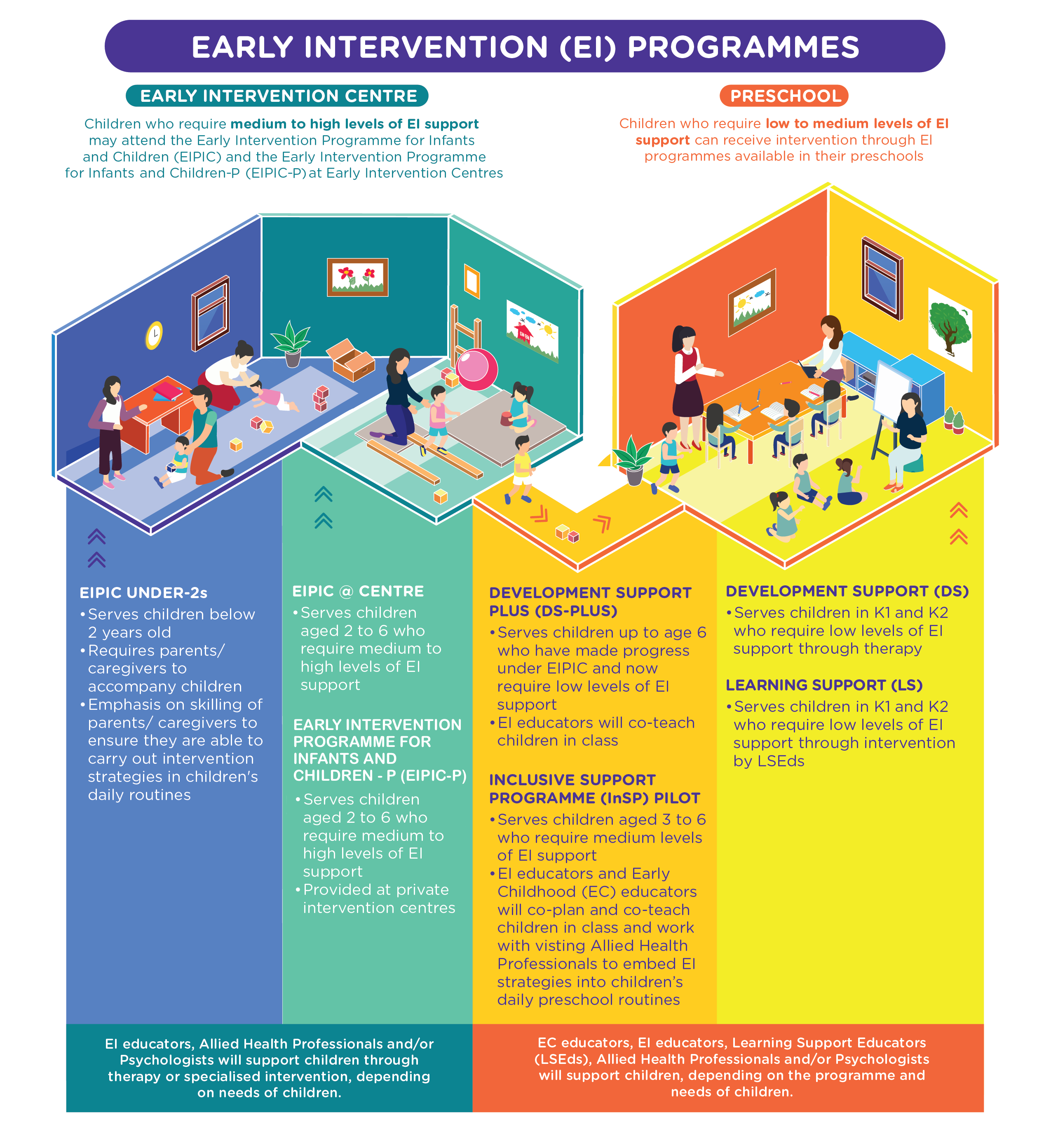Early Intervention Services
Early Intervention: The early years in a child’s life represent the most critical period of their early years. Early intervention (EI) taps on this growth potential to help children with developmental needs (DN) gain skills that maximise their capability for independence.
Currently, children under the age of 7 can receive intervention through government funded EI Programmes.

Children who require low levels of EI support may be recommended to take up Development Support (DS) or Learning Support (LS) packages under the DS-LS Programme which aim to provide short-term support for these children within their natural environment, i.e. the preschool setting. Children with minimal or no DN, but require
intervention for difficult and challenging behavioural, emotional or psychological issues (e.g. anxiety, depression, trauma, conduct disorder etc.) may also be identified for DS.
Children who require medium to high levels of EI support,
such as those with multiple developmental conditions, who would be better supported under the Early Intervention Programme for Infants & Children (EIPIC – EIPIC Under-2s and EIPIC@Centre). The programmes are delivered at EI centres by a team of EI professionals and allied health professionals
(AHPs).
Children identified to have made sufficient progress under the EIPIC@Centre programme are recommended to receive intervention in a preschool under the Development Support-Plus (DS-Plus) programme.
Children who require medium levels of EI support may also be suitable for the Inclusive Support Programme (InSP) pilot. The InSP pilot is expected to run for three yuears at each of the seven selected preschools. The InSP provides an inclusive learning experience to both
typically developing children and children with developmental needs. By integrating both early childhood education and early intervention in a preschool setting for children with developmental needs, it seeks to enhance their engagement and
holistic development while reducing the logistical strain of shuttling between preschools and early intervention centres. Enrolment into the InSP will depend on the assessment by paediatrician and screening at the InSP preschool.
For information on other EI programme, you may visit the Enabling Guide.
Apart from EI programmes, children may also seek medical consultations and interim therapy at KKH Department of Child Development (KKH-DCD) clinics and NUH Child Development Unit (NUH-CDU) clinics, which are under the national Child Development Programme (CDP), funded under Ministry of Health (MOH).
Parents' Guide for Young Children Who Require Early Intervention
Are you concerned about your child's development? Do you want to learn more about how you could support your child?The Parents' Guide may provide considerations and answers to some of your questions. Find out more about:
- Your child's development,
- Accessing Early Intervention (EI) support,
- Supporting your child's transition from EI to school-aged provisions, and
- Accessing support for yourself and your family.
*For the best desktop viewing experiencing, check "Two Page View" and "Show Cover Page in Two Page View" under Page Display options. No settings are required when viewing on mobile devices.
Useful Resources
Enabling Guide by SG Enable
Explore the programmes and support available to caregivers/parents of children who require
EI support
Families For Life Parenting
Find useful tips and resources on raising children.
Find useful information and practice guidelines on the range of EI programmes, assessments for developmental needs and transition from EI to school-aged provisions.
Early Intervention News
Find press releases or news related to EI programmes
